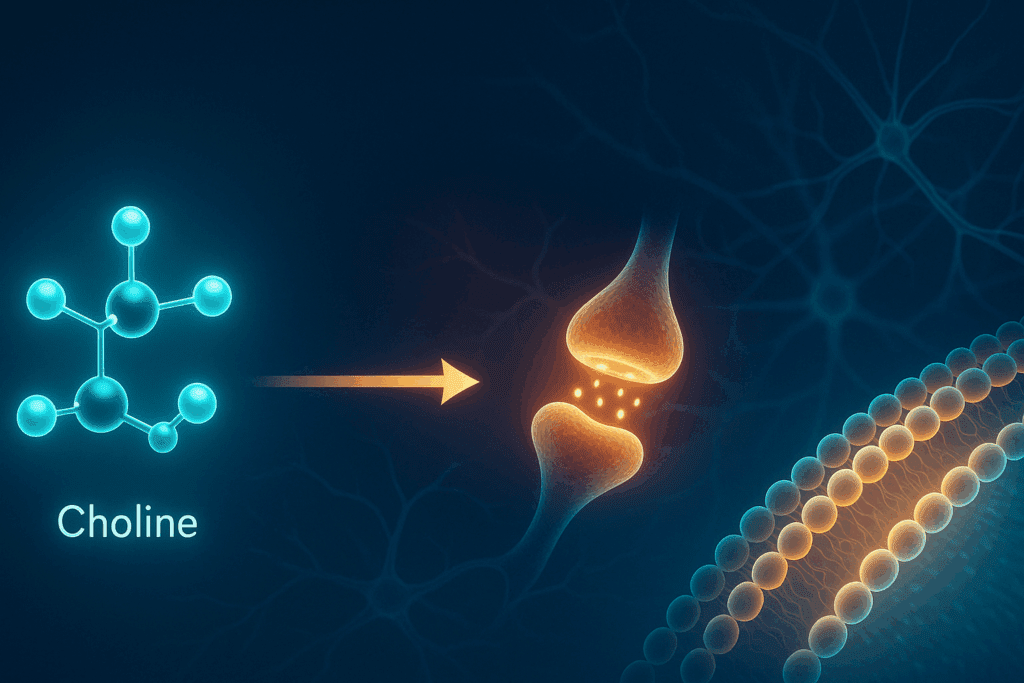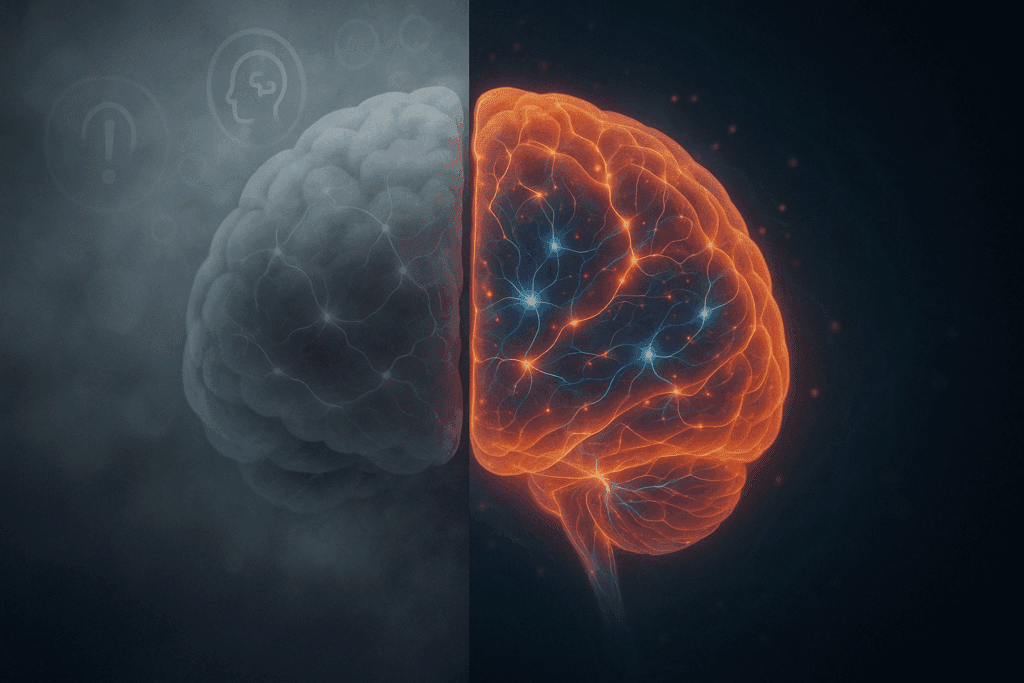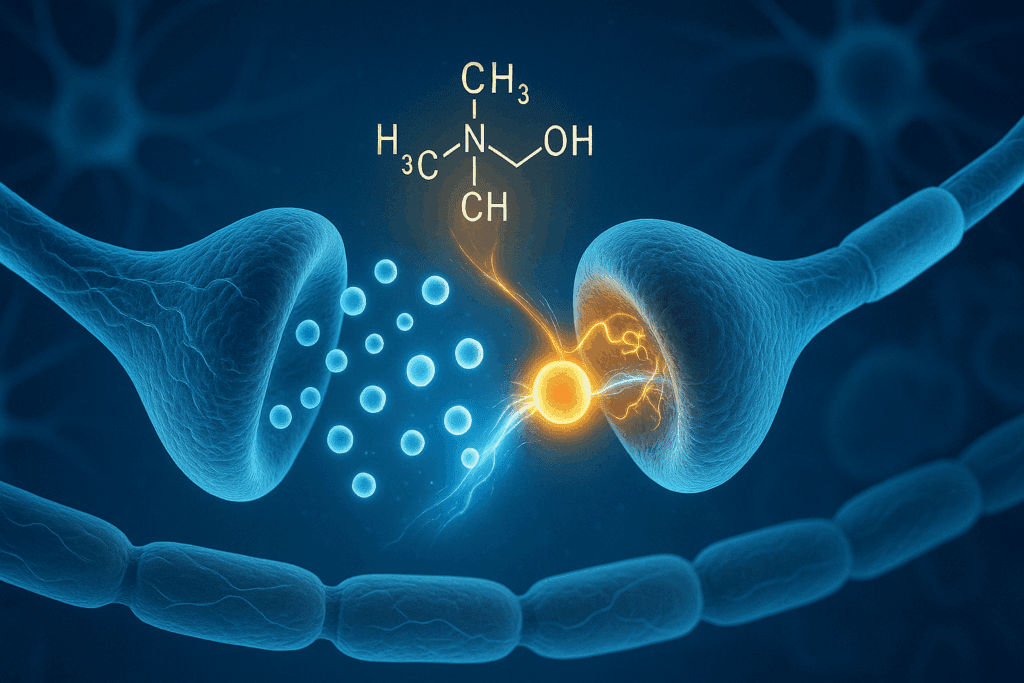In the realm of nutritional neuroscience, the role of choline is often underappreciated, even though it serves as a linchpin for optimal cognitive performance. As our understanding of the human brain deepens, the complex interplay between nutrients and neurological function becomes increasingly clear. Choline, a vital compound involved in neurotransmitter synthesis, brain cell integrity, and epigenetic regulation, is one such nutrient deserving of closer scrutiny. A diet low in choline is not just a marginal deficiency—it can quietly impair neural communication, memory retention, and mental clarity. For individuals experiencing persistent brain fog or diminished cognitive agility, the absence of adequate choline may be a crucial, overlooked factor.
You may also like: Citicoline vs Alpha GPC: Which Choline Source Offers the Greatest Cognitive Support?
This article explores how insufficient choline intake can subtly but profoundly disrupt mental sharpness and emotional balance. Drawing on the latest peer-reviewed research and clinical observations, we delve into the nuanced ways choline deficiency manifests in cognitive dysfunction. At the same time, we’ll examine practical strategies to recognize and correct this nutritional gap. As we progress, you’ll gain insight not only into the biochemical consequences of a diet low in choline but also into the lifestyle and dietary choices that can mitigate or prevent such deficits.

Understanding Choline: Its Central Role in Brain Health
Choline is an essential nutrient that bridges the domains of neurological development, cognitive resilience, and cellular metabolism. Though the human body can synthesize small amounts of choline endogenously, this capacity falls short of meeting the physiological demands placed on the brain and nervous system, particularly during times of stress, growth, or aging. Choline is required for the production of acetylcholine, a neurotransmitter that governs learning, memory, and muscle control. Without sufficient choline, acetylcholine levels decline, resulting in impaired neural signaling and cognitive dullness.
Additionally, choline is a precursor to phosphatidylcholine, a major component of neuronal cell membranes. This phospholipid contributes to membrane flexibility and facilitates the efficient transmission of signals across synapses. A diet low in choline jeopardizes this structural integrity, leading to diminished synaptic plasticity—the brain’s ability to adapt, learn, and form new connections. Research also shows that choline influences epigenetic regulation by donating methyl groups critical for gene expression, highlighting its far-reaching impact on neurobiology.

The Cognitive Consequences of Choline Deficiency
Cognitive function relies heavily on the uninterrupted transmission of signals between neurons, and this delicate process hinges on adequate levels of choline. When individuals consume foods low in choline, they may initially experience subtle but significant cognitive impairments. These may include persistent forgetfulness, decreased attention span, and difficulty concentrating—symptoms that are often dismissed as everyday stress or fatigue but may, in fact, be rooted in nutritional imbalance.
Brain fog, in particular, is a hallmark complaint among individuals with low choline intake. This nebulous condition is characterized by a sense of mental cloudiness, slowed thinking, and impaired executive function. Emerging studies link this phenomenon to reduced acetylcholine synthesis and weakened neuronal membrane structures. A prolonged diet low in choline can exacerbate these symptoms, potentially leading to more serious outcomes such as accelerated cognitive aging or heightened risk of neurodegenerative diseases.
Moreover, the interplay between choline and other micronutrients—such as B-vitamins and omega-3 fatty acids—underscores its centrality in maintaining mental clarity. Choline acts synergistically with folate and vitamin B12 in homocysteine metabolism, and disruptions in this process have been associated with brain atrophy and impaired cognitive performance. The absence of sufficient choline magnifies these vulnerabilities, particularly in populations with genetic polymorphisms that compromise methylation pathways.
Brain Fog and the Silent Signals of Nutritional Imbalance
Brain fog is a multifaceted experience that often escapes clinical recognition due to its subjective nature. Yet for many, it significantly impairs daily function and emotional well-being. It may manifest as forgetfulness during meetings, a sense of detachment in conversations, or the inability to process information at the usual pace. While these symptoms are commonly attributed to poor sleep or high stress, growing evidence suggests that dietary insufficiencies—specifically a diet low in choline—may be at the root of this cognitive haze.
Choline’s contribution to acetylcholine production is instrumental in maintaining short-term memory and attentional focus. When this neurotransmitter is in short supply, even simple tasks can feel overwhelming. In such cases, brain fog is not a temporary inconvenience but a chronic barrier to productivity and mental performance. Foods low in choline compound the problem by failing to replenish the body’s reserves, especially if other sources of neural nourishment are also lacking.
From a clinical standpoint, choline deficiency should be considered in differential diagnoses when patients present with unexplained cognitive fatigue. It is particularly relevant in individuals adhering to plant-based or low-fat diets, as these often exclude rich sources of choline such as eggs, liver, and fatty fish. Without proper awareness, the condition may persist unnoticed, quietly undermining one’s cognitive health.

At-Risk Populations and Dietary Trends Contributing to Choline Deficiency
Despite its importance, choline remains a neglected nutrient in mainstream dietary guidelines. Many health-conscious individuals inadvertently adopt eating patterns that reduce their choline intake. Vegan and vegetarian diets, while beneficial in many respects, often exclude animal-based foods that are the richest choline sources. Similarly, individuals following low-fat or cholesterol-reducing diets may cut out egg yolks and organ meats—two of the most concentrated sources of dietary choline.
Populations with increased physiological demands—such as pregnant women, athletes, and older adults—are especially vulnerable to the effects of a diet low in choline. During pregnancy, choline is vital for fetal brain development, and inadequate intake has been linked to neural tube defects and long-term cognitive issues in offspring. Athletes, due to high metabolic turnover, require enhanced nutrient support, including choline for muscular coordination and mental stamina. Older adults face compounded risks as natural synthesis of choline declines with age, while their need for cognitive support increases.
The cultural shift toward plant-based diets, while environmentally beneficial, must be navigated with care to avoid unintended nutritional deficiencies. Fortified foods and targeted supplementation can bridge the gap, but awareness and education are critical. Without deliberate efforts to include adequate sources of choline, individuals may unwittingly consume foods low in choline, compromising their mental vitality.

Foods Low in Choline: What to Watch For
While the emphasis often falls on what to eat for brain health, it’s equally important to recognize what not to eat—or rather, what diets lack essential nutrients like choline. Commonly consumed foods that are low in choline include refined grains, sugary snacks, and many processed plant-based products. These items dominate modern convenience diets but contribute little to the body’s choline reservoir.
Even seemingly healthy dietary staples, such as fruits and leafy greens, offer minimal choline. While beneficial in other respects, relying on these alone without complementary nutrient-dense foods may inadvertently create a choline-deficient state. Plant milks, tofu, and whole grains, while nutritionally valuable, do not typically provide enough choline to meet daily needs unless fortified. Thus, individuals must be mindful of their broader dietary pattern.
It is worth noting that even among omnivores, choline intake can fall below recommended levels. Busy lifestyles, dietary restrictions, and misinformation about cholesterol have led many to avoid choline-rich foods like eggs and liver. As a result, brain fog and reduced cognitive capacity can manifest across various demographics, not solely those adhering to plant-based diets. The key lies in dietary balance and strategic food selection, ensuring that choline needs are met consistently.

The Biochemical Link Between Choline and Neurotransmission
The neurochemical processes that govern memory, focus, and emotional regulation hinge on neurotransmitters like acetylcholine. As one of the few nutrients directly involved in neurotransmitter synthesis, choline holds a unique position in the maintenance of mental performance. A diet low in choline disrupts this synthesis pathway, leading to reduced neurotransmitter availability and impaired synaptic communication.
Acetylcholine is essential not only for memory but also for regulating the parasympathetic nervous system. It calms the body, supports digestion, and promotes a state of cognitive readiness. Without sufficient choline to produce acetylcholine, the nervous system can become dysregulated, contributing to symptoms of anxiety, restlessness, and poor concentration. This multifaceted role explains why choline deficiency can affect both cognitive and emotional health.
Furthermore, phosphatidylcholine—the phospholipid form of choline—is critical for neuronal repair and regeneration. It supports the structure of the myelin sheath, which insulates nerve fibers and ensures rapid signal transmission. Low levels of choline compromise myelin integrity, slowing cognitive processing and increasing mental fatigue. These biochemical changes often present subtly at first but can escalate if left unaddressed.
Assessing and Addressing Choline Deficiency Through Diet
The most effective way to prevent brain fog and cognitive decline associated with low choline is through proactive dietary management. For most individuals, the recommended daily intake of choline ranges from 425 mg for women to 550 mg for men. However, this requirement can increase based on individual needs, lifestyle factors, and genetic predispositions. Given that many modern diets fall short of these targets, intentional food choices become essential.
Incorporating choline-rich foods such as egg yolks, beef liver, salmon, and chicken can help restore balance. For plant-based eaters, soybeans, quinoa, and cruciferous vegetables offer modest amounts, although supplementation may still be necessary. The challenge lies in identifying and minimizing reliance on foods low in choline, especially those consumed frequently out of convenience.
Food journaling and nutrient tracking apps can be valuable tools for assessing intake. They help highlight dietary patterns and reveal nutrient gaps that might not be immediately obvious. When deficiency is suspected, working with a registered dietitian or integrative health practitioner can provide personalized guidance. These professionals can recommend dietary adjustments and targeted supplements that align with one’s health goals and ethical considerations.

Cognitive Recovery and Nutrient Repletion Strategies
Reversing the cognitive effects of a diet low in choline is both possible and promising. Individuals who transition to a choline-adequate diet often report improvements in memory, focus, and emotional stability within weeks. These changes are facilitated not only by restoring acetylcholine production but also by enhancing the structural and functional health of brain cells.
Pairing choline with complementary nutrients such as omega-3 fatty acids and B-complex vitamins can amplify its benefits. Omega-3s, particularly DHA, support neuronal membrane fluidity, while B-vitamins aid methylation processes essential for gene expression and neurotransmitter synthesis. This synergistic approach promotes a neurochemical environment conducive to healing and regeneration.
Lifestyle modifications also play a crucial role in optimizing cognitive outcomes. Adequate sleep, stress management, and regular physical activity enhance nutrient utilization and support brain plasticity. Together, these practices create the internal conditions necessary for full cognitive recovery and sustained mental performance. The process may require consistency and patience, but the rewards—increased clarity, focus, and resilience—are well worth the effort.
Frequently Asked Questions: Diet Low in Choline and Its Impact on Brain Fog and Cognition
1. Can a diet low in choline affect mood and emotional regulation in addition to cognitive clarity? Yes, insufficient choline can impact mood regulation as well as cognitive function. Choline plays a central role in synthesizing acetylcholine, which not only facilitates memory and attention but also helps regulate mood and anxiety. Individuals consuming a diet low in choline may notice an increased susceptibility to emotional volatility, irritability, or even depressive symptoms. This is particularly significant because many emotional disturbances often go unconnected to dietary causes. Including adequate choline in the diet could improve emotional stability by supporting neurotransmitter balance and reducing the chronic stress response.
2. Are there any early behavioral signs that might suggest someone is consuming foods low in choline? One of the subtler indicators of choline deficiency is reduced mental stamina—individuals may find it harder to stay focused during tasks that previously required minimal effort. They might also experience prolonged recovery time from cognitive exertion, such as needing longer breaks between tasks. A diet low in choline could also contribute to an increased tendency toward distraction or “zoning out,” particularly during high-stress or information-heavy environments. Some people may also report becoming more socially withdrawn due to reduced mental sharpness or slower verbal recall. While these signs are not definitive on their own, they often accompany choline inadequacy.
3. How might long-term consumption of foods low in choline affect aging and neurodegeneration? Over time, chronically low choline intake can exacerbate the risk of neurodegenerative disorders, particularly Alzheimer’s disease and other dementias. Choline supports the structural integrity of neuronal membranes, and without it, these membranes deteriorate faster under oxidative stress. Additionally, choline is involved in methylation—a key process in maintaining DNA stability—which becomes increasingly important with age. A diet low in choline accelerates biological aging in the brain by reducing the resilience of neurons and increasing vulnerability to inflammation. Therefore, ensuring consistent choline intake is especially important for those aiming to preserve cognitive function as they age.
4. Is there a difference in how men and women respond to a diet low in choline? Yes, gender-specific differences can influence how the body responds to low choline intake. Premenopausal women often have a slight advantage because estrogen enhances endogenous choline synthesis. However, this hormonal benefit declines with age, particularly after menopause. Men, by contrast, tend to have a higher dietary requirement for choline due to greater lean body mass and differing hormonal profiles. This means that both genders must be vigilant—especially during life stages marked by hormonal shifts—to ensure they are not relying too heavily on foods low in choline.
5. Can a diet low in choline be offset by other nutrients like B-vitamins or omega-3s? While B-vitamins and omega-3 fatty acids can support brain health and work synergistically with choline, they do not replace its unique functions. B-vitamins, particularly folate and B12, collaborate with choline in methylation processes, but they cannot synthesize acetylcholine or maintain phospholipid structures in neurons on their own. Similarly, omega-3s promote membrane fluidity but do not contribute to acetylcholine synthesis. A diet low in choline, even if rich in these other nutrients, can still result in specific deficits that impair cognition. Therefore, a balanced approach is critical, with choline as a non-negotiable component.
6. How do common food allergies or intolerances complicate choline intake? Many individuals allergic to eggs, dairy, or fish—three primary sources of dietary choline—must navigate additional challenges to maintain adequate levels. When such allergens are eliminated, people often unknowingly turn to foods low in choline, assuming they’re making healthier choices. These restrictions can compound the risk of deficiency unless alternate choline-rich plant-based sources or fortified foods are introduced. For individuals with such dietary limitations, consulting a dietitian can help identify safe, alternative sources or determine if supplementation is needed to prevent cognitive side effects.
7. Are there reliable plant-based ways to prevent the effects of a diet low in choline? Yes, but it requires deliberate planning. While most plant-based foods are inherently low in choline, a few exceptions—such as soybeans, quinoa, and certain cruciferous vegetables—contain modest amounts. Fortified products like plant-based milks and cereals can also contribute if they are enhanced with choline. However, achieving optimal levels solely through a plant-based diet is difficult without careful monitoring. Supplementation is often recommended for vegans or vegetarians who consistently rely on foods low in choline, especially those experiencing brain fog or fatigue.
8. What are the long-term academic or professional consequences of chronic brain fog due to low choline? Chronic brain fog can subtly but significantly impact academic and professional performance. Individuals may find themselves underperforming relative to their capability, particularly in roles requiring rapid processing, multitasking, or memory retention. A diet low in choline can hinder one’s ability to plan, make decisions, or articulate ideas clearly—all of which are crucial in competitive environments. Over time, this can erode confidence and even impact career advancement. Identifying and addressing the nutritional roots of such performance dips is essential for long-term success.
9. Can a diet low in choline affect sleep patterns or circadian rhythms? Emerging research suggests that choline may play a role in regulating sleep through its influence on the parasympathetic nervous system. Acetylcholine, derived from choline, helps transition the brain into restful states and supports REM sleep. When dietary intake is insufficient, people may experience fragmented sleep or find it difficult to enter deeper sleep stages. Additionally, foods low in choline offer limited support for nighttime neurotransmitter regulation, potentially affecting circadian stability. Thus, optimizing choline intake could benefit not just daytime alertness but also nighttime recovery.
10. How might future food technologies address the widespread issue of choline deficiency? Future innovations in food science are likely to focus on biofortification—enhancing staple crops with essential nutrients like choline. As public awareness grows around the consequences of a diet low in choline, demand for fortified plant-based options will likely rise. Precision nutrition apps that track choline intake alongside other micronutrients may also help consumers tailor their diets more effectively. Additionally, advances in synthetic biology could lead to lab-grown choline supplements with enhanced bioavailability. These developments offer hope for addressing widespread choline inadequacy without requiring drastic dietary changes.
Conclusion: Reclaiming Cognitive Clarity Through Nutritional Awareness
In today’s fast-paced world, where mental performance is constantly tested, understanding the impact of a diet low in choline becomes not just a matter of nutritional trivia but a pillar of cognitive well-being. Choline is far more than a supporting actor in the theater of brain health—it is a protagonist that influences everything from memory and focus to mood regulation and neural resilience. Yet despite its centrality, it often remains in the shadows of dietary awareness.
Foods low in choline are widespread in modern diets, especially among those emphasizing plant-based or low-fat paradigms. While these eating patterns offer many benefits, they also pose risks if not carefully balanced. Recognizing these risks empowers individuals to make informed choices that support both ethical and cognitive goals. Reintegrating choline-rich foods or supplementing strategically can be the key to reversing brain fog, restoring focus, and enhancing long-term brain function.
Ultimately, the journey to cognitive clarity begins with curiosity and a willingness to investigate the root causes of mental fatigue. For many, that path leads directly to the breakfast plate, the grocery list, and the everyday food decisions that shape the health of our most vital organ. By acknowledging the role of choline and addressing its absence through thoughtful nutrition, we take a powerful step toward a clearer, more focused, and more vibrant mind.
Was this article helpful? Don’t let it stop with you. Share it right now with someone who needs to see it—whether it’s a friend, a colleague, or your whole network. And if staying ahead on this topic matters to you, subscribe to this publication for the most up-to-date information. You’ll get the latest insights delivered straight to you—no searching, no missing out.
Further Reading:
Choline and Brain Fog: Unveiling the Cognitive Connection
Important Note: The information contained in this article is for general informational purposes only, and should not be construed as health or medical advice, nor is it intended to diagnose, prevent, treat, or cure any disease or health condition. Before embarking on any diet, fitness regimen, or program of nutritional supplementation, it is advisable to consult your healthcare professional in order to determine its safety and probable efficacy in terms of your individual state of health.
Regarding Nutritional Supplements Or Other Non-Prescription Health Products: If any nutritional supplements or other non-prescription health products are mentioned in the foregoing article, any claims or statements made about them have not been evaluated by the U.S. Food and Drug Administration, and such nutritional supplements or other health products are not intended to diagnose, treat, cure, or prevent any disease.


